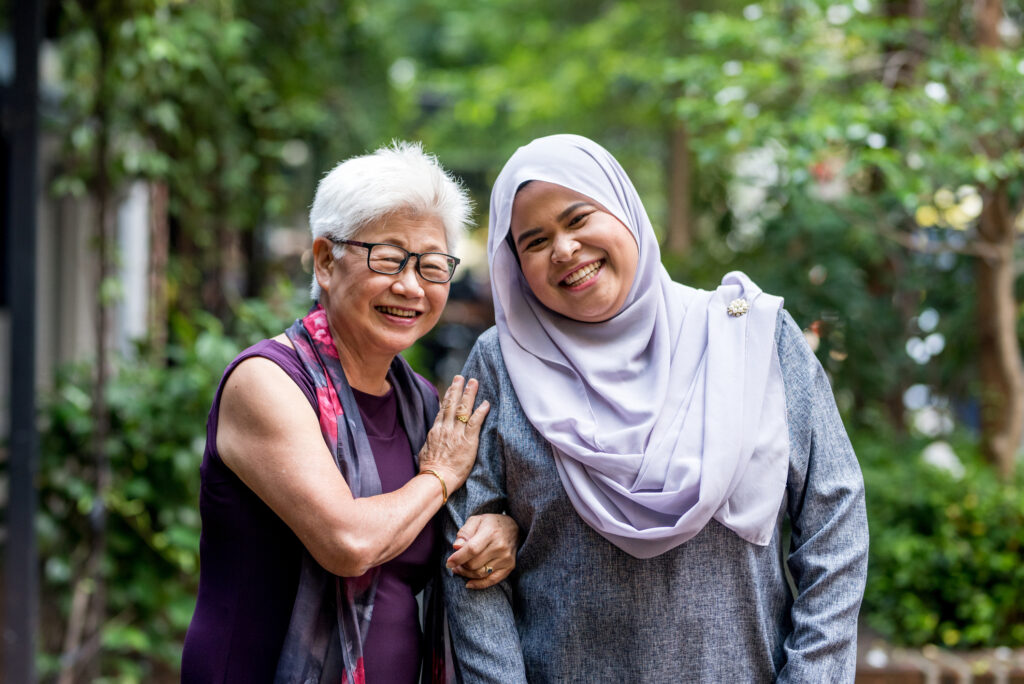As older Americans increase in number, so does the population of those with Alzheimer’s disease and related dementias. More than 6 million Americans have Alzheimer’s and related dementias; that number is projected to grow to over 12 million by 2050. States have partnered with public health, aging, social services, and Medicaid agencies to address the needs of those with dementia and their caregivers. At NASHP’s 2023 Conference in Boston, leaders shared insights on the future of tackling this growing public health challenge and state examples of dementia care promising practices.
Dementia and Caregiving in the U.S.
Joseph Gaugler is director of the BOLD Public Health Center of Excellence on Dementia Caregiving and professor at the University of Minnesota. Through partnerships with local and state public health departments, the BOLD Center works to build a national infrastructure to address dementia as a public health problem. Gaugler said dementia requires a public heath approach because of its impact on the population, both among those with Alzheimer’s disease and other dementias and their caregivers. In the U.S., more than 11 million unpaid dementia caregivers provide upwards of 16 billion hours of dementia care annually, valued at approximately $271.6 billion. The long-term care system relies on these caregivers to provide care for their loved ones with dementia, but the system does not provide adequate supports to care for the caregivers. This leads to burnout and reduced quality of life for individuals living with dementia and their families. While caregivers often find the role rewarding, dementia caregiving also comes with more emotional and physical stress, as compared to non-dementia caregivers and non-caregivers.
Recognizing the essential and difficult work of dementia caregivers, Gaugler pointed to policy solutions to support them and those to whom they provide care, such as:
- Education campaigns to bring awareness to the potential health-related issues of caregiving and to teach skills for the caregiver to support the care recipient and themselves
- Evidence-based interventions to reduce caregiver burden, provide access to training, and link caregivers with health care services and sources of support in the community
- The new CMS Guiding an Improved Dementia Experience (GUIDE) Model to address the unique needs of individuals with dementia and their caregivers by defining and requiring a comprehensive, standardized care delivery approach
- Alignment of recommendations to improve dementia care and support for dementia caregiving across states, agencies, and advocates to enable the tracking of progress toward shared goals and successful implementation
State Strategies in Dementia Care
In addition to national approaches, state-specific programs support dementia care and dementia caregivers. Utah and Wisconsin are both strong examples of states that have implemented such interventions. Leaders from these states presented their unique programs at the conference.
Utah
Kristy Russell, health program specialist for Alzheimer’s disease and related dementias in Utah’s Division of Aging and Adult Services, explained how the state leverages its state plan, feedback, and flexibility to improve dementia care statewide.
The “Utah Alzheimer’s Disease and Related Dementias (ADRD) State Plan,” most recently released in 2022, outlines strategies and recommendations to address the needs of persons with dementia, their caregivers, and professionals in Utah through 2030. The plan includes strategies, targets for change, and action steps for its five priority areas:
- Dementia awareness: Improve public awareness and understanding of ADRD through culturally appropriate messaging and targeted education programs
- Dementia-competent workforce: Enhance dementia education programs and resources for health care providers and explore standardization of dementia training and certification
- Research: Increase ADRD research funding and promote participation in research studies
- Living well with dementia: Increase availability and utilization of resources to support people with dementia through intergenerational programming, reducing disparities in resource access and use, and reducing stigma by empowering those with dementia
- Caregivers: Improve self-identification of caregivers and increase awareness of caregiver resources
Key Facts from Utah’s ADRD State Plan
- Alzheimer’s disease affected 34,000 Utah residents in 2020 and is predicted to rise 23.5% by 2025.
- Alzheimer’s disease cost Utah Medicaid $185 million in 2020, combined with almost $2 billion in unpaid care provided by Utah family caregivers, and costs are projected to increase significantly.
- Dementia is the fourth leading cause of death in Utah.
The plan was created under the guidance of the ADRD Coordinating Council and builds on work accomplished through previous iterations of the plan. Because anyone in Utah is welcome to join the Coordinating Council, the state continually integrates feedback from a wide range of individuals with experience relating to dementia and dementia caregiving.
Utah collects caregiver and dementia data and feedback in each Area Agency on Aging’s (AAA’s) region to inform how and to whom AAAs provide services. In soliciting direct feedback from the AAAs, the state discovered that staff from the AAAs felt that the communities within their regions would benefit from different programs rather than what was being provided on a statewide level. The state creatively split the state dementia care funding into smaller amounts for each of the AAAs, enabling each AAA to spend the money on what would best serve the local dementia and dementia caregiver populations. AAAs now use these funds for a variety of services and supports, including staff time for AAA employees, caregiver self-care kits, resources and equipment for community members with dementia, and more.
Wisconsin
Kristen Felten, dementia specialist for the Office on Aging at the Wisconsin Department of Health Services, shared insights on how Wisconsin creates dementia-friendly communities, addresses social isolation and loneliness, and implements evidence-based programs for dementia care.
Through the Dementia Care Specialist Program, Wisconsin staffs each Aging and Disability Resource Center (ADRC) and the 11 federally recognized Tribes across the state with a dementia care specialist. These specialists provide information and supports to individuals with dementia and their caregivers and work within their county to create a dementia-friendly community. The program began as a pilot, but it is now a fully state-funded program that enables each county to have a reliable and supportive dementia expert to improve the quality of life for individuals with dementia living at home. The three pillars of the program and the three goals of each dementia care specialist are:
- Train staff at the ADRC and other county and municipal offices to assist local systems to become dementia-capable
- Help communities become dementia-friendly, where people with dementia can remain active and safe and caregivers can feel supported by their community
- Provide education and support to people with memory concerns or dementia, and their families, to allow them to live at home safely
Other states interested in the Dementia Care Specialist Program can use the program’s ADRC Operations Manual as a guide for implementation.
To further facilitate the creation of dementia-friendly communities, Wisconsin provides dementia customer service training to important local businesses, popular places for gathering, and civic organizations. The state also organizes a “memory cafe” volunteer-run program, which creates a social and safe environment for people with dementia and their caregivers. These efforts are essential to making sure individuals with dementia can remain at home and integrated in the community if they wish to do so. Read more about Wisconsin’s dementia initiatives in a recent interview with Wisconsin’s Lynn Gall, newly sworn-in member of the RAISE Family Caregiving Advisory Council
Key Takeaways for State Policymakers
At some point in our lives, we all will be personally affected by or know someone affected by Alzheimer’s disease and related dementias and the care required. The demand for higher quality dementia care is clear and growing, requiring a coordinated and comprehensive public health approach to help the significant portion of the population who will feel the effects. Utah and Wisconsin are strong examples of states who are creatively and intentionally providing information, supports, and services to individuals with dementia and their caregivers.
To learn more about how states can support family caregivers, visit the RAISE Act Family Caregiver Implementation and Technical Assistance Center on NASHP’s website. To access resource guides with concrete actions for various sources of potential caregiver support — from employers, to managed care plans, to state officials, and more — visit SupportCaregiving.org.
Acknowledgement
The ”Unforgotten: Supporting People with Dementia and Their Caregivers” conference session and this blog post were developed as products of the RAISE Act Family Caregiver Implementation and Technical Assistance Center and with generous funding and guidance from The John A. Hartford Foundation.





